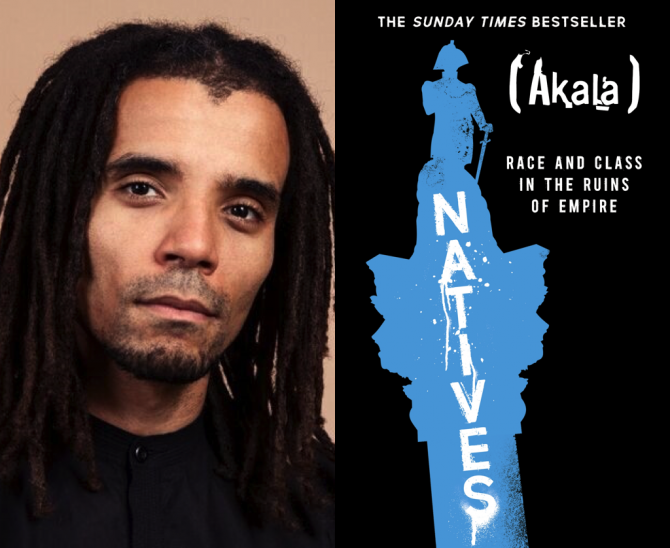In my mind, there was no better place to host a conversation on race and class in the ruins of empire than the Christchurch YMCA. Walking through the winding passageways to the hall that was hosting Akala, my working class sensibilities felt at ease; walking past the YMCA gym gave me a sense of familiarity to the surroundings in particular. Like I said, there was no better location to host a conversation on race and class.
Akala was introduced by Sacha McMeeking - Head of the School of Maori and Indigenous Studies at the University of Canterbury - who spoke passionately and eloquently on the subjects that were to follow. Sacha spoke to how conversations like this were important as they involved “engaging with the realities that make racism possible”. She also briefly discussed grief; salient given that the wounds Christchurch - with particular mention to the Muslim community in Christchurch - were still recovering from. Of course, the subject of racism was a sensitive one as the wounds of March the 15th are still very fresh.
After Sacha’s beautiful introduction, Akala began his talk by quoting an extended passage from his book, Natives. The following passage speaks to what was to follow:
“I was born in the ‘mother country’ of the British Commonwealth, the seat of the first truly global empire, the birthplace of ‘the’ industrial revolution and the epicentre of global finance. What does this mean? What are the social and historical forces that even allowed my parents to meet? My father is the British-born child of two African-Jamaican migrant workers who came to the mother country as part of the Windrush generation. My mother was an army child, born in Germany, spending her infant years in Hong Kong and moving to the small town in which I was born in her early teens”

So what were the historical forces that made all of this possible?
Akala spoke of going to school in Camden - a suburb in London. Here, he described it as the most culturally diverse area in the country and one of the most diverse in the world as it was home to “130 languages and about as wide a divide between rich and poor as anywhere in the country”. In his eyes, this diversity coupled with the inequality makes Camden a perfect petri dish for multicultural England. However, he recalls his time at school, and how the historical forces that made this multicultural landscape exist - colonisation, the slave trade, immigration from other parts of the Commonwealth etc - did not get taught and it was left not discussed and undiagnosed to appear “as if it all happened by magic”.
But it didn’t happen by magic. Instead, there is a very complex history through colonisation and capitalism that lead to creating the multicultural environment describe above. Through the expansion of the British Commonwealth to include an increasing number of populations - including the Jamaican population that Akala’s father came from - and the migration that this facilitated, forced or otherwise, lead to the creation of multicultural Britain. However, this is complicated further through the intersection of race and class within a capitalist society.
Akala spoke about how the structures that enabled racism were created deliberately by the British Government when it passed the British Nationality Act in 1962 in order to prevent people of colour from entering the country; however, the structures of racism had already existed before the law. Previously, all members of the British Commonwealth holding a British passport could enter Britain; this Act put limits to that in such a way that disadvantaged people of colour. It is worth mentioning that the British Nationality Act was largely re-written in 1981, but by then the damage had already been done.
However, race is not the only consideration to be made. Akala shared statistics from the school system in England that demonstrated that the children of affluent migrants of colour from the former colonies - Nigeria, Jamaica, etc - outperformed both the children of working class whites and blacks whose families come from England. This highlights that there is an intersection of race and class that manifests itself in a material reality through the lived experiences of those who experience it; such as Akala himself. Akala stated this simply by saying “race is complicated by class”.
Akala was a great speaker, and refreshing in his working class charisma. His talk was a timely one given the turbulent political landscape that exists presently in New Zealand surrounding immigration and issues of race; particularly in the aftermath of the Mosque attacks on March the 15th. A pertinent voice in this political climate, Akala offered a good analysis of the machinations of race and class to those who were there to listen.
Akala is a BAFTA and MOBI Award winning hip-hop artist, writing, and social commentator. His book Natives: Race and Class in the Ruins of Empire is an extremely well written account of his personal experiences of racism and working class anxieties coupled with analysis of the greater economic and social climate surrounding his life as well as the lives of millions of others to create a superb account of tensions of race and class as it exists in Britain in contemporary society.
- Find books by Akala in our collection.




Add a comment to: Akala: Natives, Race and Class in the Ruins of Empire – WORD Christchurch Autumn Season